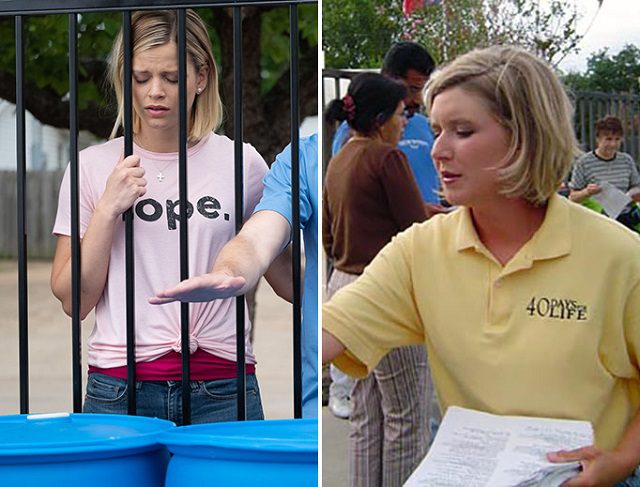. . . But There is a Particular Time and Place for Such Language

My friend, Rebecca Bratten Weiss, co-founder of the New Pro-Life Movement, has written:
Unfortunately, just as there is a genuine anti-life attitude on the part of some abortion proponents . . . the readiness to ignore questions of culpability and cry “murder” – serious pro-lifers need to realize just how wrong-headed these views are. But we need to realize, also, that most people who take these positions are operating out of ignorance and fear. (“thank you, donald trump! “, 3-31-16)
The statements that we make because we believe them to be true or logical do have an effect, and it’s not necessarily a convincing or persuasive one. For instance: to say “abortion is murder” seems like a strong and compelling stance in defense of life. But when one refers to abortion as “murder” the obvious takeaway, for any woman who has had an abortion, is that she’s just been called a murderer.
. . . And yet many of the people who say these things will very sincerely declare that they aren’t anti-women. (“who’s listening when we talk about abortion?”, 4-19-17)
With all due (and sincere) respect (and I will heartily agree with other points of hers, below), at least three popes have done exactly this (describe abortion as “murder”), including Pope St. John Paul II in his majestic 1995 encyclical, Evangelium Vitae (The Gospel of Life). Let’s start with him first:
Given such a grave situation, we need now more than ever to have the courage to look the truth in the eye and to call things by their proper name, without yielding to convenient compromises or to the temptation of self-deception. In this regard the reproach of the Prophet is extremely straightforward: “Woe to those who call evil good and good evil, who put darkness for light and light for darkness” (Is 5:20). Especially in the case of abortion there is a widespread use of ambiguous terminology, such as “interruption of pregnancy”, which tends to hide abortion’s true nature and to attenuate its seriousness in public opinion. Perhaps this linguistic phenomenon is itself a symptom of an uneasiness of conscience. But no word has the power to change the reality of things: procured abortion is the deliberate and direct killing, by whatever means it is carried out, of a human being in the initial phase of his or her existence, extending from conception to birth.
The moral gravity of procured abortion is apparent in all its truth if we recognize that we are dealing with murder and, in particular, when we consider the specific elements involved. The one eliminated is a human being at the very beginning of life. (section 58; my bolding)
Two other popes spoke in the same way:
However we may pity the mother whose health and even life is imperiled by the performance of her natural duty, there yet remains no sufficient reason for condoning the direct murder of the innocent. (Pope Pius XI, Casti Connubii [On Christian Marriage], 1930, sec. 64; my bolding)
Children are the greatest gift. Children who are welcomed as they come, as God sends them, as God allows — even if at times they are sick. I have heard that it is in fashion — or at least customary — in the first months of pregnancy to have certain exams, to see whether the baby is not well, or has some problems…. The first proposal in that case is: “Shall we do away with it?”. The murder of children. And to have a nice life, they do away with an innocent. (Pope Francis, Address to the Delegation of the Forum of Family Associations, Vatican City, 16 June 2018; my bolding)
How can an act that suppresses the innocent and defenseless budding life be therapeutic, civilized or simply humane? Is it right to snuff out a human life to solve a problem? Is it right to hire a hit man to solve a problem? No, you can’t. It’s not right to take out a human being, a small one, too, in order to fix a problem. It is like hiring a professional killer. (Pope Francis, Weekly General Audience, St. Peter’s Square, 10 October 2018; my bolding)
Dr. Douglas Beaumont adds:
[E]ven if the words “abortion” and “murder” were never equated in uncertain terms (which they are), it is both unreasonable and tiresome to insist that the Church do so in every instance. The Church (also) clearly teaches that abortion is murder indirectly by the transitive principle (If A=B & B=C then A=C), and it does so in too many sources to list. To cite just one example, the Baltimore Catechism (Q. 1275 A.) says, “It is never lawful for any cause to deliberately and intentionally take away the life of an innocent person. Such deeds are always murder, and can never be excused for any reason, however important or necessary.” Such a description of murder certainly includes abortion.
Catholic writer Mark Shea considers himself, I believe, part of the New Pro-Life Movement, and he stated (on 1-24-14):
Normal people know that this is murder. Being consequentialists as most Americans are, they don’t necessarily let the fact that it is murder stop them from supporting it. But most people shift uneasily in their seats when abortion fanatics say, in cold blood, “So what if it’s murder?” The average “pro-choice” person feels the sting of conscience when confronted by such feverish apostles for evil and edge away humming “Don’t stand so, don’t stand so, don’t stand so close to me.” They have a haunted conscience. They’d much rather not think about it.
I agree. I also heartily agree with Rebecca’s view that calling women who abort or who are considering abortion “murderers” is not the way to successfully deal with them and persuade them to not abort and/or to become pro-life. There is a time and place for anything. St. Paul wrote:
1 Corinthians 9:19-22 (RSV) For though I am free from all men, I have made myself a slave to all, that I might win the more. [20] To the Jews I became as a Jew, in order to win Jews; to those under the law I became as one under the law — though not being myself under the law — that I might win those under the law. [21] To those outside the law I became as one outside the law — not being without law toward God but under the law of Christ — that I might win those outside the law. [22] To the weak I became weak, that I might win the weak. I have become all things to all men, that I might by all means save some.
The same Jesus Who could be so gentle with children and the woman caught in adultery also “prophetically” thundered against and condemned the moneychangers in the temple, the scribes and Pharisees, and will come back to earth with “a sharp sword with which to smite the nations, and he will rule them with a rod of iron; he will tread the wine press of the fury of the wrath of God the Almighty” (Rev 19:15). “Meek and mild Jesus”? Yes, most of the time . . . other times, quite the opposite. Jesus is Judge as well as Savior and Redeemer.
In other words, I am contending that there is a proper time (within the purview of ethical discussion and moral theology and Catholic social teaching) to call abortion “murder” — and popes and other important persons in the Church have done so (and Evangelium Vitae carries a very high magisterial authority). Therefore, it is going too far to say that this terminology should never be used by a pro-lifer, or to automatically attribute unsavory characteristics to the one who does so (without crucial consideration of context).
But on the other hand, there is the pastoral, evangelistic, compassionate, sympathetic, empathetic, gentle, prayerful, charitable approach in one-on-one situations: which was shown, for example, in Marilisa Carney: the woman who prayed outside the Planned Parenthood abortion clinic in the movie, Unplanned, who played a key role in helping the clinic administrator Abby Johnson change her mind and to become pro-life: mostly by simply being a genuine friend for her. Accordingly, I wrote in my short review of that excellent film:
Unplanned showed (based on the real-life experiences of Abby Johnson) both dumb, harmful abortion protesters and compassionate, loving pro-life prayer warriors who simply expressed love to Abby: didn’t even try to argue about abortion with her (the ones she was friendly with and eventually turned to for help after her change of mind).
As someone who has been in many rescues and prayer vigils at clinics, rallies and marches and so forth, that really touched me. And I can testify that the vast majority of pro-life activists (at least the ones I have observed, which is much more than a few), are closer to that model than to the fools with their taunts and seeming personal derision, etc.
So Rebecca’s point in this regard (which is perhaps her primary one) is well-taken, and I have always agreed with it, and moreover, I dare say that the vast majority of pro-life activists (I have been in the movement since 1982) would also concur. I entirely agree with the following statement of hers which can be found in one of her articles that I cited above:
When crafting arguments about abortion, we in more academic circles tend to draw heavily on philosophical arguments about the dignity of the human person, personal rights, and the primacy of the right to life. We also draw upon scientific arguments about when the heartbeat begins, or the capacity to feel pain. The focus is on making a strong case for the inherent rationality of the pro-life approach. Some arguments are better than others, of course, and much depends on the intellectual capacity as well as the ethical presuppositions of the interlocutor. . . .
But pro-life discourse can’t focus simply on being right. It has to be effective. In classical rhetoric, reasoning (logos) is only one of three parts. The others are ethos (character, especially moral character) and pathos (the emotional effect on the interlocutor). . . .
Many might say that the emotional response to a statement or argument is unimportant. And, if this were a logic class, they would be correct. But abortion does not typically happen in a logic class. It happens in complex circumstances, with many intersecting lines of power and overlapping moral concerns as well as personal fears. Do some women go out and get abortions as blithely as they’d go get a haircut? Some, yes. But not the majority.
Most women who end up opting for abortion do so because of pre-existing pressures. And one can hardly call it a “choice” when they are given so few other options. . . .
And yes, this means working with women who are pro-choice, instead of demonizing them. And it definitely means watching how we talk about life issues, because often our most crucial audience is the one we’re most likely to hurt and alienate with thoughtless rhetoric.
There is actually much common ground here, between pro-life activists: whether on the political right, left, middle, or apolitical (if such a thing is even possible). I try to build bridges between different factions of the large pro-life movement. Unfortunately we allow the devil to divide us far too often. I expressed my honest disagreement with Rebecca above, on one particular, and now I am expressing agreement: which is significant.
Back to my point about speaking differently in different contexts: we find that the same Pope St. John Paul II who called abortion “murder” also took into account (in the same portion of his encyclical) difficult situations and differential culpability, including responsibility of many parties besides just the woman who chose to have an abortion:
It is true that the decision to have an abortion is often tragic and painful for the mother, insofar as the decision to rid herself of the fruit of conception is not made for purely selfish reasons or out of convenience, but out of a desire to protect certain important values such as her own health or a decent standard of living for the other members of the family. Sometimes it is feared that the child to be born would live in such conditions that it would be better if the birth did not take place. Nevertheless, these reasons and others like them, however serious and tragic, can never justify the deliberate killing of an innocent human being.
59. As well as the mother, there are often other people too who decide upon the death of the child in the womb. In the first place, the father of the child may be to blame, not only when he directly pressures the woman to have an abortion, but also when he indirectly encourages such a decision on her part by leaving her alone to face the problems of pregnancy: in this way the family is thus mortally wounded and profaned in its nature as a community of love and in its vocation to be the “sanctuary of life”. Nor can one overlook the pressures which sometimes come from the wider family circle and from friends. Sometimes the woman is subjected to such strong pressure that she feels psychologically forced to have an abortion: certainly in this case moral responsibility lies particularly with those who have directly or indirectly obliged her to have an abortion. Doctors and nurses are also responsible, when they place at the service of death skills which were acquired for promoting life.
But responsibility likewise falls on the legislators who have promoted and approved abortion laws, and, to the extent that they have a say in the matter, on the administrators of the health-care centres where abortions are performed. A general and no less serious responsibility lies with those who have encouraged the spread of an attitude of sexual permissiveness and a lack of esteem for motherhood, and with those who should have ensured—but did not—effective family and social policies in support of families, especially larger families and those with particular financial and educational needs. Finally, one cannot overlook the network of complicity which reaches out to include international institutions, foundations and associations which systematically campaign for the legalization and spread of abortion in the world. In this sense abortion goes beyond the responsibility of individuals and beyond the harm done to them, and takes on a distinctly social dimension. (sections 58-59)
Thus we see that Pope John Paul the Great incorporates elements emphasized by different portions of the pro-life movement. He doesn’t hesitate to call abortion what it undeniably is (“murder”), while at the same time he places the decision to abort in a very wide social context: with plenty of blame to go around, and seriously considers causes for the “demand” for abortion: just as the New Pro-Life Movement highlights. He agrees with Rebecca and he agrees with my present point, too. And he does because his is the fully-rounded, consistently and fully Catholic pro-life view: expressed in the most magisterial document on the issue in the history of the Church.
The question is, then: why do we pro-lifers insist on fighting each other and creating unnecessary divisions? More politically conservative and more politically centrist or liberal pro-lifers have plenty in common, or what we ought to be able to agree is common opinion (far more than what we differ on). If we would stop condemning each other and talk to each other and do a lot more to understand our fellow pro-lifers who have different approaches and emphases, but who are every bit as committed to the cause as we are, things would be much better off. But too often, we put political affiliation above allegiance to the magisterium of the Church: even though both “sides” claim we are not doing that.
The Catholic Church offers a “third way”: ultimately neither “left” nor “right”: as I wrote about years ago. St. Paul often excoriates divisions and sectarianism and stupid controversies. And Catholic “liberals” (and/or Democrats or third party) may be surprised how much Catholic conservatives (and/or Republicans) are like them in many ways (see my own views as one example).
We will continue to have honest disagreements in the pro-life movement: especially on tactics and grand strategy, but we also have relatively lots more agreement that should keep us talking to each other and working together (in our own little niches or “booths”) for the good of the Cause, and to consider each other brothers and sisters rather than “enemies.”
Psalm 133:1 Behold, how good and pleasant it is when brothers dwell in unity!
***
Photo credit: LEFT: Emma Elle Roberts portrays Marilisa Carney in a scene from Unplanned (unplannedfilm.com). RIGHT: The real-life Marilisa Carney (40 Days for Life).
***













